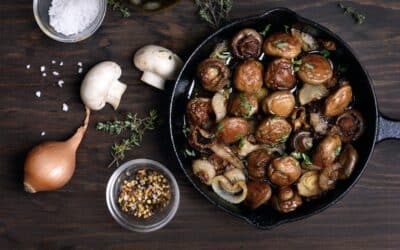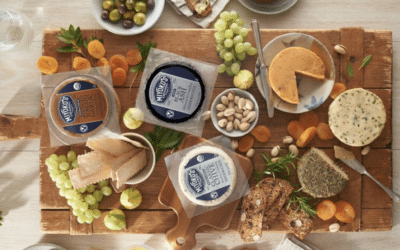Cow’s milk is so often marketed for its protein content, and we don’t deny that it does contain an adequate amount—eight grams of protein per one-cup serving. That being said, cow’s milk is not an optimal source of protein due to the baggage it comes with: bovine hormones, trans fat, cholesterol, Neu5gc, IGF-1, and more. Humans don’t need to drink cow’s milk to hit their protein quota, because there are plenty of other dairy-free milks that contain a substantive amount of protein without this detrimental baggage. Even the USDA has declared that soy milk is nutritionally equivalent to cow’s milk per the 2020 US Dietary Guidelines. But what about other dairy-free milks? Each is unique in regards to its nutrient and taste profile. You can learn more about each individual milk’s taste in this article, but for now, we’re focusing on protein content. Here is everything you need to know about milk protein content, ranked.
Note: some protein values differ by brand and product. For example, some “super,” “ultra,” or “protein plus” products may be fortified with additional protein. This ranking is based on the unsweetened, unfortified standard for each of these dairy-free milks.
Dairy-free Milks Protein Content: Ranked
8 Grams of Protein
Soy, Pea, Cow
Soy milk, pea milk, and cow’s milk all contain eight grams of protein. When looking for a one-to-one protein swap for cow’s milk, soy and pea are excellent options. In regards to taste and texture, both soy and pea milk are thick, creamy, and delicious. Enjoy straight from the glass or add them to a post-workout smoothie for an immediate protein boost. You can even find chocolate soy and pea milk!
Check out these brands:
Eden (soy)
Silk (soy)
Pacific (soy)
Ripple (pea)
4 Grams of Protein
Cashew, Oat
Both cashew and oat milk hover around four grams of protein per eight-ounce serving. Oat has become wildly popular in cafes and coffee shops thanks to its ultra creaminess and ability to foam (hello, latte art). Cashew milk is a terrific non-dairy milk to keep at home. It has a very pleasant, naturally sweet and slightly nutty flavor yet it’s extremely versatile. Use cashew milk for cereal, cookie-dunking, or straight by the glass!
Check out these brands:
So Delicious (cashew)
Elmhurst (cashew)
Oatly (oat)
Califia Farms (oat)
3 Grams of Protein
Walnut
Walnut milk isn’t all too common, but Elmhurst makes a two-ingredient walnut milk that is great for cooking and baking. Use it whenever you want to impart a bit of walnutty flavor into your food. With three grams of protein, it’s a nice boost to get you to your daily goal.
Check out these brands:
Elmhurst
2 Grams of Protein
Hemp, Hazelnut
Unfortified hemp and hazelnut milk both contain two grams of protein per one-cup serving. Hemp is a creamy, allergen-friendly option for those with sensitivities to nuts or soy. Hemp milk is also a source of omega 3s and 6s, which is uncommon to find in most dairy-free milks. Hazelnut milk is nutty and ideal for those who love hazelnut flavor.
Check out these brands:
Tempt (hemp)
Pacific (hemp)
Elmhurst (hazelnut)
1 Gram of Protein
Almond, Rice
Both almond and rice milk have been around for a while, but they’re not the best sources of protein. That doesn’t mean they don’t have a place in your diet. Almond milk is delicious on its own and makes an excellent latte. Rice milk is very neutral in taste and ideal for those with sensitive stomachs. Your protein doesn’t have to come from a non-dairy beverage (or any beverage). According to Dr. Neal Barnard of the Physicians Committee for Responsible Medicine, as long as you eat a varied diet and consume enough calories for your body and activity level, you’ll get enough protein even on a plant-based diet.
Check out these brands:
Califia Farms (almond)
Pacific (almond)
Almond Breeze (almond)
Rice Dream (rice)








